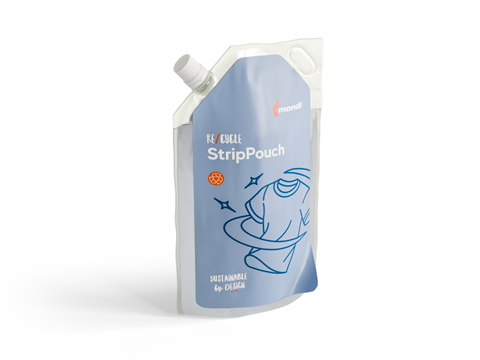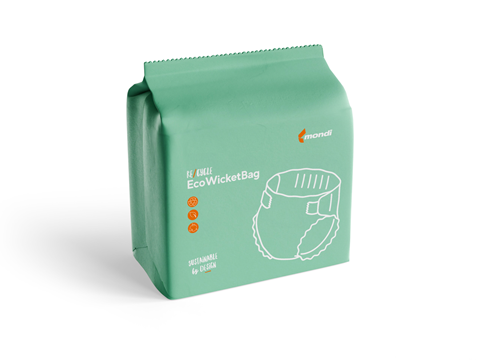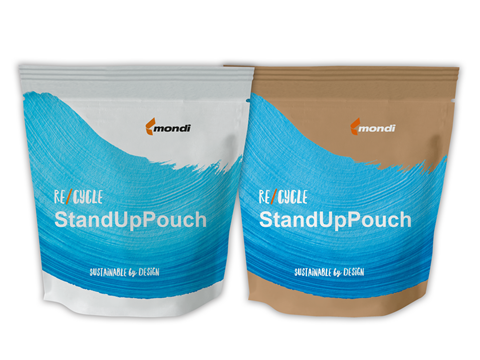
In this edition of our ‘In Conversation With…’ series, Alessandro D’Agostino, global business development manager for Home & Personal Care at Mondi, tells us how the company envisions sustainable progress for flexible packaging in his sector.
Tell us about yourself. What does your role at Mondi entail, and how has your previous industry experience contributed to it?
I joined Mondi in January 2021, coming from Comexi, a Spanish company making machinery for flexible packaging. Before that, I was always interested in sustainability and saw Mondi as a leader in this area.

Alessandro D’Agostino
My background is in architecture, which made me think about design and structure in a more holistic way — not just focusing on how something looks, but how it works within a broader system. I think that kind of perspective is really valuable as we explore new directions in packaging.
I started as Sales Manager for the Spanish market at Mondi and moved into business development for the Home and Personal Care (HPC) sector, having global responsibilities. My role is quite complex — I work closely with R&D, marketing, sales teams and machinery producers to develop and promote sustainable packaging solutions.
In terms of sustainability, can you give us an overview of the current HPC market? Is there room for improvement?
Definitely. The HPC packaging market is evolving fast, meaning there is a lot of change happening when it comes to packaging for liquid soaps, wet wipes, laundry detergents, dishwashing tabs, feminine care and hygiene products, and many more household items.
Especially with more pressure from consumers and regulators alike to improve sustainability, the packaging landscape in the sector is constantly progressing. Regulations like the Packaging and Packaging Waste Regulation (PPWR) are pushing the industry to raise standards, and it’s clear that sustainability isn’t just a nice-to-have any more — it’s essential to stay competitive and meet consumer expectations.
In the personal care sector, 59% of EMEA consumers* say expressing their individuality is a top life priority – meaning they want products that reflect their unique identities, from lifestyle to values. Going along with that, consumers are demanding products that not only deliver on performance but prioritize environmental responsibility, meaning that sustainability is no longer a differentiator but it’s the baseline expectation (e.g. Mondi’s re/cycle EcoWicketBag).
In the homecare industry, on the other hand, functionality is the key. Consumers value convenient, cost-efficient and more sustainable packaging formats like refill pouches with easy-open and reclose features such as spouts (e.g. Mondi’s re/cycle StripPouch for laundry detergent).
* (source: Kantar Profiles/Mintel, September 2024)

What would you say is, or should be, the main sustainability concern for producers of HPC packaging?
The biggest concern has to be designing packaging that’s circular and uses recycled materials, but without compromising on product protection. It’s important to avoid just ticking boxes or superficial claims — the solutions need to be genuinely reducing our environmental impact.
Circular economy thinking is central to this shift, focusing on keeping materials in use longer and designing out waste from the start. Balancing technical performance, cost and sustainability is a real challenge, but it’s where the focus has to be.
What developments is Mondi making in the HPC space? Can you give us some examples?
First of all, we’re focusing a lot on mono-material packaging, which makes recycling much simpler. We´ve developed re/cycle StripPouch for liquid soap and liquid detergent, made from 100% PE-based mono-material, and ready to be recycled. It has removable front and back panels with excellent printing properties, which are mechanically separated from the unprinted PE-pouch during the sorting and recycling process.
Another example is re/cycle EcoWicketBag. It’s a recyclable, paper-based alternative to plastic-based WicketBags made from extremely durable kraft paper. It’s holding and protecting hygiene products such as diapers, feminine hygiene products, toilet paper or sanitary products.
At Mondi, we offer a suitable solution for each packaging challenge. While certain goods can be wrapped in paper packaging, others need a stronger barrier functionality that can be provided by plastic or coated paper only.
We work closely with our R&D teams, machinery partners and customers to test and qualify different materials and solutions – all with innovative designs in mind that keep materials in circulation and avoid waste.

Have you faced any challenges when developing more sustainable solutions for this sector?
Yes, there are quite a few challenges. One of our current challenges is moving to mono-material packaging without losing barrier properties or shelf life, which is very technical. It requires extensive testing and close collaboration with all stakeholders to ensure solutions work in real production environments.
Another challenge is incorporating PCR content in packaging, which is something the upcoming PPWR has on its agenda as well: By 2030, plastic packaging must contain a minimum percentage of recycled content. Especially in the personal care industry, the packaging containing PCR content has to be up to par with current hygiene standards, which makes it a challenging endeavour.
What does Mondi have planned for the HPC market in the future? Are there any new products in the pipeline?
We’ve already launched several innovative solutions for the HPC market such as a paper-based StandUpPouch for dishwasher tabs – and we’re building on that momentum. Next, we’re developing sustainable packaging solutions for more demanding HPC products like liquids and gels, where barrier performance and functionality are critical. With our pilot lines at the newly opened FlexStudios, we co-develop and test materials with our customers and machinery partners, accelerating time-to-market.

Digital printing is also gaining traction, enabling shorter print runs, less waste, and more customization — a major asset in the HPC space where brand identity matters.
With deep expertise across paper and polymer packaging, we recommend the best-fit sustainable option for each application and help our customers achieve their sustainability goals. We are actively working towards our MAP2030 (Mondi Action Plan) goals and ensuring that everything we deliver meets the highest standards.
More about the Packaging and Packaging Waste Regulation: https://www.mondigroup.com/products-and-solutions/packaging-and-packaging-waste-regulation/
Mondi’s approach towards sustainability: https://www.mondigroup.com/sustainability/mondi-action-plan-2030/
About Mondi: https://www.mondigroup.com/














No comments yet